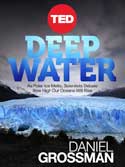 We know that sea level rise is an inevitable consequence of the global warming that our continued burning of fossil fuels is causing. What we don’t know is how much to expect and how soon to expect it. Journalist Daniel Grossman in his Kindle Single Deep Water: As Polar Ice Melts, Scientists Debate How High Our Oceans Will Rise explores the momentous issue by looking at the work of three scientists who study the past history of elevated sea levels to get a better understanding of what is likely ahead for humanity. Grossman writes from a close acquaintance with climate science and his ability to distil the science in readily understandable form for the general reader is outstanding.
We know that sea level rise is an inevitable consequence of the global warming that our continued burning of fossil fuels is causing. What we don’t know is how much to expect and how soon to expect it. Journalist Daniel Grossman in his Kindle Single Deep Water: As Polar Ice Melts, Scientists Debate How High Our Oceans Will Rise explores the momentous issue by looking at the work of three scientists who study the past history of elevated sea levels to get a better understanding of what is likely ahead for humanity. Grossman writes from a close acquaintance with climate science and his ability to distil the science in readily understandable form for the general reader is outstanding.
Paul Hearty, “talented and cantankerous”, is a geologist who has argued from his studies of inter-glacial periods that if the Earth warms by two degrees the huge glaciers in Greenland and Antarctica could substantially melt in a short space of time. His field work in the Bahamas and Bermuda, which he regards as a relatively stable region geologically, has led him to the conclusion that in the warm interglacial 400,000 years ago (Stage 11) sea level rose by as much as around 19 metres. Paleoclimatologist Maureen Raymo doesn’t share that view but it was Hearty she invited in 2009 to collaborate in field work with her in Western Australia seeking evidence of sea level rise in the Pliocene. Grossman travelled with them as journalist and gives a lively account of the expedition.

 MP Nick Smith in a NZ Herald
MP Nick Smith in a NZ Herald 
 The reign of climate change denial in the US Republican Party is an extraordinary spectacle, hard to credit in an educated modern democracy. It’s also a very sad spectacle in view of the prominent role the US plays in contributing to climate change and the potential leading role it could play in mitigating it. I often wonder what members of the party who take science seriously and understand climate change make of the phenomenon. A recent podcast interview with noted atmospheric scientist
The reign of climate change denial in the US Republican Party is an extraordinary spectacle, hard to credit in an educated modern democracy. It’s also a very sad spectacle in view of the prominent role the US plays in contributing to climate change and the potential leading role it could play in mitigating it. I often wonder what members of the party who take science seriously and understand climate change make of the phenomenon. A recent podcast interview with noted atmospheric scientist  “It has become a rogue industry, reckless like no other force on Earth. It is Public Enemy Number One to the survival of our planetary civilization.” These are the words Bill McKibben uses to describe the fossil-fuel industry in a recent
“It has become a rogue industry, reckless like no other force on Earth. It is Public Enemy Number One to the survival of our planetary civilization.” These are the words Bill McKibben uses to describe the fossil-fuel industry in a recent